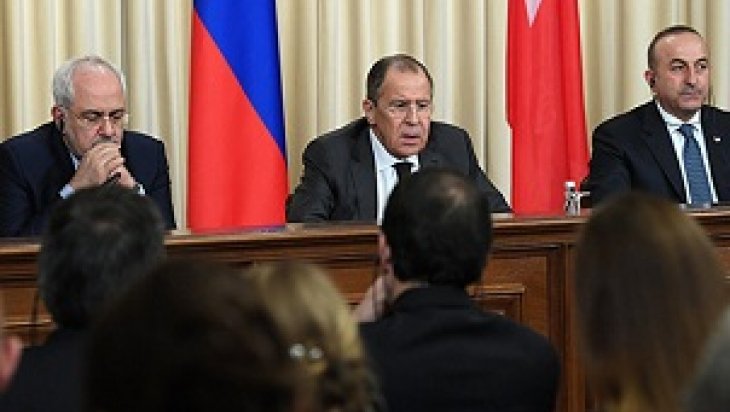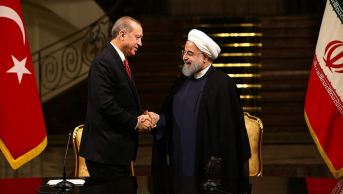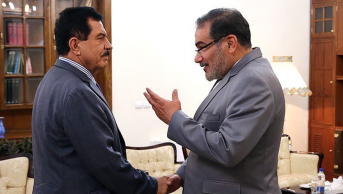Trilateral Meeting Between Turkey, Iran and Russia and the Moscow Declaration

Diplomatic interactionshave been accelerated between Turkey, Iran and Russia since August 2016. Issues like the crisis in Syria, the Operation Euphrates Shield, and fight against terrorism have constitutedthe main agenda of those diplomatic contacts. Additionally, there has been an ongoing close cooperation between Iran and Russia particularly with regard to Syria. After the Russian involvement in the Syrian crisis, the two countrieshave set up a joint ‘information center’ in Baghdad in order to coordinate their relations,which has also been joined by the Assad administration and the Iraqi government. Iran permitted Russian warplanes to use its aerospace and airbase in Hamadan. They have also assigned Alexander Lavrentiev, Special Representative of Russian President Vladimir Putin for Syria, and Rear Admiral Ali Shamkhani, Secretary of Supreme National Security Council of Iran, for the coordination of cooperation between the two countries with related to the Syria issue. As in the words of Ali Akbar Velayati, a key figure in decision-making regarding Iranian policy towards Syria, Iran and Russia have a “common ground” with regard to Syria, for the “prevention of the collapse of Syria and protection of its territorial integrity” and they corresponded their activities in the region with the Assad administration. Defense ministers of the three countries held a joint meeting in Tehran in June 2016, and their foreign ministers met at Moscow in October 2016.
While Turkey has intensified its relations and exchanges with Russia and Iran, Iranian Minister of Foreign Affairs, M. Javad Zarif, according to the Iranian sources, put forward the idea of trilateral meeting of the three countries to address the Syria issue. The failure of previous attempts led by Russia and the United States to solve the issue, in other words, “the failure to implement decisions” that were made with the United States, as stated by Sergey Lavrov, Russian Foreign Minister, paved the ground for the trilateral meeting. The fact that all the three states have been disturbed by some of the US policies in Syria, and they have common concerns with regard to the preservation of territorial integrity of Syria and the fight against terrorism,helped to devise a mechanism for trilateral meeting. Yet, it was not easy to come that point. Mistrust between the parties turned into a crisis at times as in the case of evacuation of civilians and armed opposition from Aleppo. Some militiamen affiliated with Iran, who thought themselves to be excluded from the deal brokered between Turkey and Russia, attacked the evacuation convoys. Iran was thinking that a cease-fire and evacuation would serve to interests of the insurgents. Additionally, in return for the evacuation of opposition from Aleppo,Iranian allied forces asked the evacuation of Shiite civilians and wounded people in the towns of Foua and Kafraya that have been besieged by the opposition forces in the countryside of Idlib. Then, former commander of the Revolutionary Guards, Mohsen Rezai tweeted on December 18, “any secret political or field agreement in Syria is doomed to failure without Iran’s participation.”
The growing cooperation and dialogue between the three countries, however, yielded first concrete results on the issue of evacuation from Aleppo. Despite the frequent attacks on the evacuation convoys, the operations were maintained through intensive exchanges between Ankara, Tehran and Moscow. Eventually, the trilateral meeting, which was initially designed to be held on December 27th, moved to an earlier date and heldin Moscowon December 20th. Russian Foreign Minister initially held bilateral meetings with his Turkish and Iranian counterparts, and then they held a joint session. In the meantime, Sergei Shoigu, Russian defense minister, met his Turkish and Iranian counterparts Fikri Işık and Hossein Dehqhan respectively. At the end of the talks, they issuedthe Joint Statement of Iranian, Russian and Turkish Foreign Ministers; in other words, the ‘Moscow Declaration.’
The Moscow Declaration
The Moscow Declaration that consisted of eight articles, “reiterated full respect” of the three countries “for sovereignty, independence, unity and territorial integrity of the Syrian Arab Republic as multi-ethnic, multi-religious, non-sectarian, democratic and secular state.” The parties welcomed “joint efforts in Eastern Aleppo allowing for voluntary evacuation of civilians and organized departure of armed opposition.” They underlined “the importance of expanding ceasefire, unhindered humanitarian assistance and free movement of civilians throughout the country.” Turkey, Iran, and Russia reiterated “their determination to fight jointly against ISIL/DAESH and Al-Nusra and to separate from them armed opposition groups.”
It is stated in the declaration that “there is no military solution to the Syrian conflict.” The partiesrecognized“the essential role of the United Nations in the efforts to resolve this crisis in accordance with UNSC resolution 2254 (2015).” The Ministers also noted “the decisions of the International Syria Support Croup (ISSG).” Iran, Russia and Turkey expressed “their readiness to facilitate and become the guarantors of the prospective agreement, being negotiated, between the Syrian Government and the opposition.” The parties stated, “they strongly believe” that the Moscow Declaration would be “instrumental to create the necessary momentum for the resumption of the political process in Syria in accordance with the UNSC resolution 2254.”
The most important outcome of the Moscow meeting was that for the first time such atrilateral sessionof Turkey, Iran and Russia for the solution of Syria crisis was held. Indeed, the three countries havepreviously joined various multilateral conferences in different formats. But, the three countries joined together for the first time in the International Syrian Support Group (ISSG), which was held in Vienna in October 2015. The UNSC Resolution 2254 dated December 18th, 2015endorsed the “Vienna statements”as well as the 2012 Geneva Communiquéthat envisaged “a Syrian-led and Syrian-owned political transition in order to end the conflict in Syria.” Nevertheless, tangible outcomes have not been achieved until today because of the ongoing clashes in the field and various problems that come up in the implementation of agreed points.
Apparently, the Moscow Declaration complemented the Vienna statements of ISSG and UNSC Resolution 2254. In other words, most of the points stated in the Moscow Declarationwere the points that were agreed in previous international meetings. In his address to the press after the trilateral session, Russian Minister of Foreign Affairs, Lavrov, stated that “some countries” that were pursuing “the goal of changing the government in Syria” have come to “see thatthe top priority should not be government change but the liquidation of the terrorist threat.” “The three countries that are represented here share this understanding”,he added. Nevertheless, though the declaration did not directly address the transition issue, the references to UNSC Resolution 2254 and to the statements of ISSGdemonstrate the commitment of the three countries to “transition process” envisaged by the Geneva Communiqué.
The Moscow Declaration, however, differed from previous international initiatives because it stated that Turkey, Iran and Russia “expressed their readiness” to become “the guarantors of the prospective agreement” to be negotiated between the Syrian government and the opposition. The record of cooperation between the three countries on the evacuation from the Eastern Aleppo is promisingfor reaching a settlement under their mediation and guarantee.Additionally, continuation of the trilateral meetings and prospective positive outcomes of the negotiations may lay the ground for establishment and institutionalization of a regional cooperation mechanism to address regional issues.
Although the three countries have reached an agreement on certain points, those factors that hindered the realization of previous international decisionsfor solution of the Syriancrisis are still there. The prolongation of clashes in the field, divisions within the opposition and disagreements on the representation of the opposition, problems regarding the implementation of agreed points, and rival interests and policies of other regional and international actors etc. may prevent a rapid political solutionfor the Syriancrisis.











